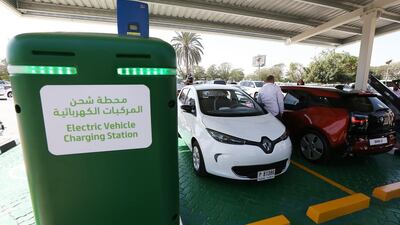ABU DHABI // The use of electric vehicles could change the quality of life for residents, but a discussion about the accessibility of charging stations is key.
Frans Anton Vermast, a strategy advisor for the city of Amsterdam, said the dilemma is “almost like a chicken and egg” issue.
“Do we not have enough electric vehicles because there are not enough charging poles, or do we not have enough charging poles because we don’t have enough electric vehicles?”
Promoting the use of electric vehicles, public transport and cycling and a shift to solar and other renewable energy could make Abu Dhabi and Dubai more sustainable, experts say.
“It is imperative to have a vision from a political leader who will make decisions that we’re going to provide this with the more habitable city so people can live, work and play in a much nicer environment,” Mr Vermast said on Tuesday at the Smart Traffic Middle East 2015 conference.
“I think there’s a role that local governments can play to help plan strategically the position of electric charging stations along with the electricity grid operator.”
Charging poles should be available to all, he said.
“I think if somebody at the top will say OK, since this will make our citizens happier, then I think that’s the way forward.”
A network of electric car-charging stations across the UAE is being rolled out to encourage more motorists to purchase eco-friendly vehicles.
“By the end of 2016, at the latest, Dubai should have good infrastructure to enable people to decide whether to buy electric cars or not,” Sam Aalwiye, chief executive of GreenParking, said in March. In February, the Dubai Electricity and Water Authority launched a dozen public charging stations at its offices. It also announced plans for 84 charging stations by the end of 2015 at malls, airports, residential communities and hotels.
But Chintaka Premahandra, an assistant professor at the Tokyo University of Science, said people in the region were “probably more comfortable” using conventional combustion-engine vehicles, mainly due to low fuel prices.
“It will all depend on the cost of the electric cars and the people’s perception towards it,” he said. “There is a need to have an effective public transportation to make cities more liveable. In bigger cities such as Tokyo, there is a dense network of train, subway and bus lines, which is on time.”
There is also a need to making the emirates safer and encourage residents to cycle.
“In Amsterdam, we have twice as many bicycles as people because everybody uses the bike as a service, basically,” Mr Vermast said. “You see that in several cities, and hopefully Abu Dhabi would also have a bicycle plan.
“So there are bikes parked there, just like in Amsterdam or in Chicago, you go there with your credit card, you just rent a bike, you cycle and you park it somewhere else so definitely you can make a city more liveable.”
Reducing congestion and generating electricity from the sun and wind would also benefit the community.
rruiz@thenational.ae

